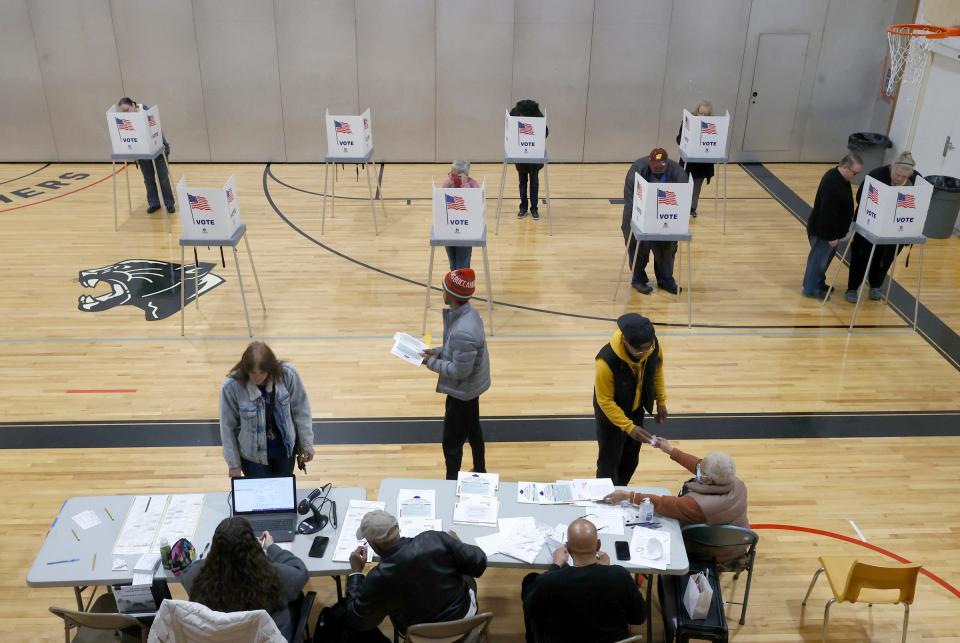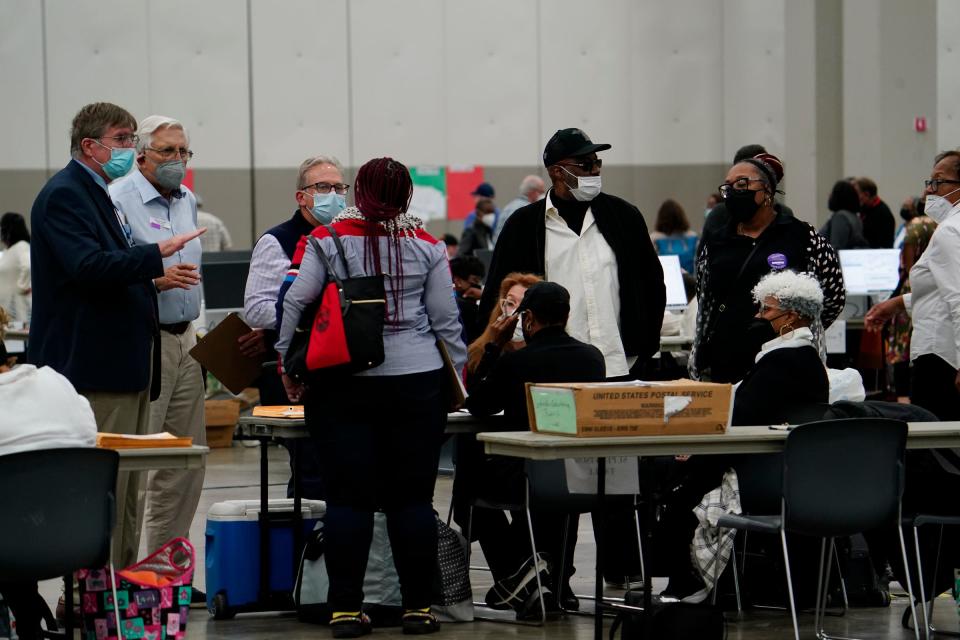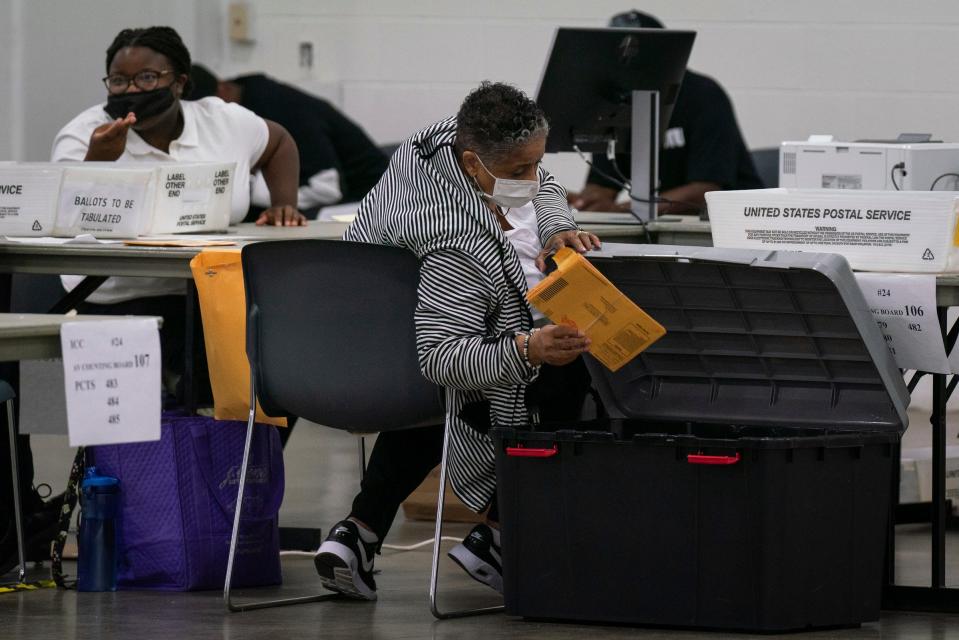Whitmer signs bills implementing election changes approved by voters
New election laws laying the groundwork for Michigan to hold its first elections under a new set of rules approved by voters who adopted an amendment to the state constitution last fall allowing early voting, codifying current voter ID laws and enabling voters to automatically receive absentee ballots for all future elections were approved by the governor Tuesday.
Gov. Gretchen Whitmer signed a series of bills implementing Proposal 2, the wide-ranging elections amendment voters who participated in last year's midterms approved with 60% support.
The 2024 presidential primary election will mark the first statewide election in Michigan under the new voting requirements spelled out in Proposal 2.
Democratic lawmakers voted to move up that election to Feb. 27, but it didn't garner the GOP support needed for the bill to take immediate effect. Instead, it will take effect 91 days after final adjournment of the Legislature (usually sometime in late December). It's unclear whether Democrats will adjourn early to ensure the new primary date takes effect in time, but Whitmer told reporters last month that she's confident Michigan will hold a primary in February.
Like the early primary legislation, none of the bills implementing Proposal 2 obtained enough GOP votes to go into effect immediately.
Here's a look at the how the legislation signed by Whitmer updates state election law to include the new voting provisions in the Michigan Constitution.

At least nine days of early voting
What the Michigan Constitution requires: Proposal 2 established a right to vote in person before Election Day in each statewide and federal election, requiring early voting sites to be open for at least nine consecutive days for at least eight hours each day, beginning on the second Saturday before the election and ending on the Sunday before the election. It also allowed election officials within a county to share early voting sites and the county clerk to conduct early voting on behalf of a local jurisdiction. Finally, it stipulated that results from early voting cannot be generated or reported before 8 p.m. on Election Day.
What the legislation does: Senate Bill 367 implements early voting, allowing up to 29 days of early voting. The new law allows early voting to be offered the Monday before Election Day up until 4 p.m. It also allows clerks to start counting absentee ballots before Election Day, a change election officials from both parties have requested. It allows any municipality to not only process but also tabulate absentee ballots one day before Election Day and up to eight days before the election in municipalities home to at least 5,000 residents.

The new law also allows voters to take their absentee ballots with them to an early voting site or their polling place and personally insert their absentee ballot into a tabulator.
House Bill 4696 updates Michigan's Code of Criminal Procedure to make it a felony to disclose election results from early voting sites before Election Day subject to a maximum prison sentence of five years.
A ballot drop box for every Michigan municipality
What the Michigan Constitution requires: Proposal 2 created a requirement for every municipality to have at least one state-funded drop box for voters to return applications to vote absentee and absentee ballots. In municipalities with more than 15,000 voters, there must be at least one drop box for every 15,000 residents registered to vote. The drop boxes must be accessible 24 hours a day during the 40 days before an election and up until 8 p.m. on Election Day. Voters must be able to return applications for an absentee ballot.
What the legislation does: House Bill 4697 adds the new drop box requirements to Michigan election law and specifies that the Secretary of State's office must pay for the costs of ballot drop box delivery, installation, repair and video monitoring. The new law requires local clerks to consider population density, proximity to public transportation and parking, as well as accessibility for voters with disabilities ,when deciding where to place drop boxes.
The bill also requires drop boxes to be monitored by video during the 75 days leading up to an election and on Election Day itself. Drop boxes ordered or installed before October 2020 would initially be exempted from the video monitoring requirement until 2026 when all drop boxes must be monitored. The new law eliminates a requirement for election workers collecting applications for an absentee ballot and ballots from drop boxes to document the number of ballot return envelopes collected.
Electronic ballot tracking system
What the Michigan Constitution requires: Proposal 2 mandated a system funded by the state to track applications to vote absentee and absentee ballots, allowing voters to opt-in to receive notifications electronically updating them on the status of their application and ballot, alerting them to any issues with what they've submitted and providing them with instructions to address them.
What the legislation does: Senate Bill 339 requires the Secretary of State to set up an electronic ballot tracking system. The system must allow the voter to see when their local clerk received and accepted their absentee ballot application. If their application was rejected, the system must spell out the reason, provide instructions for resolving the issue and a deadline for fixing the application.
The tracking system must also include when the local clerk’s office sent or provided the absentee ballot to the voter, as well as when the ballot was received and accepted. If the ballot is rejected, the system must provide instructions for resolving the issue. Under the system, voters have the option to opt in to receive notifications by email, text message or both forms of communication.
Photo ID requirement from voters
What the Michigan Constitution says: Proposal 2 created a right for voters to prove their identity when voting in person or applying for an absentee ballot in person by showing a photo ID from a federal, state, local or tribal government or an educational institution.
What the legislation does: Senate Bill 373 updates which photo IDs from educational institutions a voter can use. Currently, voters can use an an ID card from a high school in Michigan or degree- or certificate-granting colleges or universities, junior colleges or community colleges located in Michigan, according to a House Fiscal Agency analysis of the bill. The new law expands the law to include more kinds of educational institutions, such as vocational schools.
Automatically receive absentee ballots with one application
What the Michigan Constitution says: Proposal 2 established a right for voters to submit a single application to vote absentee to cover all future elections with an absentee ballot sent automatically to them. Under the Michigan Constitution, voters would have this right rescinded if they submitted a signed request to stop automatically receiving absentee ballots, the Secretary of State or election official that issues the voter an absentee ballot receives information that the voter moved, or the voter doesn't vote for six consecutive years. If a voter who has opted to automatically received absentee ballots moves within Michigan and updates their voter registration address, they do not need to fill out another application to receive absentee ballots at their new residence.

What the legislation does: Senate Bill 370 implements the process for requesting absentee ballots for all future elections with a single application. It also allows someone to register to vote and complete an application to vote absentee at the same time.
Michigan election law currently requires clerks to verify voters' signatures on absentee ballot applications and ballot return envelopes with the signature on file. But the law does not specify any criteria that should be used to verify the signature. But Senate Bill 370 spells out that a voter's signature is invalid "only if it differs in significant and obvious respects" from the one on file. "Slight dissimilarities must be resolved in favor of the (voter)."
The law establishes new requirements for notifying voters if the clerk's office is unable to determine that the signature on an absentee ballot application or ballot return envelope agrees with the one on file or the voter didn't sign it. It requires clerks to notify the voter of the problem by telephone, email or text message if available, but mail if those communication forms are not available with instructions for how to fix the signature issue.
House Bill 4699 would require locals to track permanent absentee voters using the qualified voter file, the electronic system election officials use to track voter's information. It also requires the Secretary of State's office to create a presidential primary ballot selection form for voters to select which political party's primary in which they want to participate.
In addition to the bills implementing Proposal 2, Whitmer also signed House Bill 4702 which increases the maximum size of an election precinct to 5,000 registered voters.
Contact Clara Hendrickson at [email protected] or 313-296-5743. Follow her on Twitter @clarajanehen.
This article originally appeared on Detroit Free Press: Whitmer approves laws implementing Prop 2, election changes